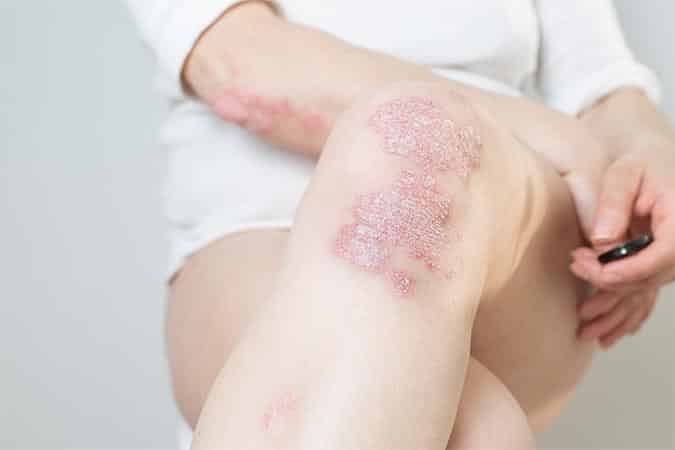What is Psoriasis?
Psoriasis is a skin disease that causes itchy, red, scaly plaques to appear on the skin. It most commonly involves the scalp, elbows, trunk, and knees. It causes skin cells to multiply up to 10 times faster than normal, making the skin build up into scaly, red plaques. Psoriasis usually appears in early adulthood and tends to go through cycles of waxing and waning throughout life.
Common signs and symptoms of psoriasis include:
- Red patches of skin with thick, silvery scales
- Dry, cracked skin that may itch or bleed
- Thickened, ridged, or pitted nails
- Swollen or stiff joints
- Itching, soreness, or burning
Some people who are predisposed to psoriasis may not have symptoms until the disease is triggered by an environmental factor. Common triggers include infections, the weather, stress, smoking, heavy drinking, injury to the skin, or certain medications.
Who is a Good Candidate for Psoriasis Treatment?
If you believe that you may have psoriasis or you have been diagnosed with psoriasis but your outbreaks have become severe or widespread, causes you itch, pain, hyperpigmentation, or causes self-consciousness regarding the look of your skin, you can benefit from psoriasis treatment. The best way to determine the best treatment for you is through a consultation with one of our dermatologists.
What to Expect During Psoriasis Treatment?
Corticosteroids: These medications are usually prescribed topically to treat mild to moderate psoriasis. They come as ointments, creams, lotions, foams, gels, sprays, and shampoos. Long-term use, however, is not recommended, as they can thin the skin or stop working. Injectable steroids are also used for stubborn areas.
Retinoids: These come as a cream or gel, and should be applied daily. However, retinoids should not be used if you are pregnant or breastfeeding, or if you intend on becoming pregnant. Oral retinoids, such as acitretin, are sometimes used for moderate-severe disease.
Methotrexate: This medication works by altering the immune system to control symptoms.
Biologic Treatments: These injectable medications work by inhibiting certain proteins in the body’s immune system to better control the inflammation involved in psoriasis. There are many biologics on the market today, and your dermatologist can speak with you to determine the best one considering your medical history, age, and lifestyle. These drugs require blood work and monitoring.
An enzyme inhibitor: The oral medication apremilast (Otezla) blocks a specific enzyme, which helps to slow other reactions that result in inflammation. It does not require blood work. A newer drug, deucravacitinib (Sotyktu) is indicated for the treatment of moderate-to-severe plaque psoriasis in adults who are candidates for systemic therapy or phototherapy.
Light Therapy: Light therapy has been safely used to treat psoriasis for decades. It involves exposing the skin to incremental amounts of specific wavelengths of ultraviolet light. Our office utilizes XTRAC laser, whole body NBUVB, hand/foot UVB, and PUVA therapy.
Novel Topical Agents: Tapinarof cream (Vtama) is an aryl hydrocarbon receptor agonist and roflumilast (Zoryve) is a PDE4 inhibitor that are now available for use.
Psoriasis FAQs
Can I put steroid cream on psoriasis?
Can you spread psoriasis by touching it?
Can psoriasis kill you?
Do I have eczema or psoriasis?
Can you catch psoriasis sexually?
Can you get psoriasis on your private parts?
Does psoriasis worsen with age?
How fast does psoriasis spread?
How is inverse psoriasis diagnosed?
What are the first signs of psoriasis?
Following Psoriasis Treatment
Following the directed use of your psoriasis treatment, you will experience fewer symptoms and discomfort associated with your psoriasis. Be sure to follow your dermatologist’s specific instructions when it comes to treatment for safe and optimal results. If you have any questions regarding treatment, do not hesitate to contact our office.
Schedule a Consultation
If you are interested in learning more about psoriasis treatments at HMGS Dermatology, contact our office today! We will be happy to schedule your consultation appointment with one of our dermatologists or physician assistants. We are regarded as the psoriasis experts in South Jersey.

Get Started With A Visit!
Fill out the form below and we will reach out to you shortly to schedule an appointment.